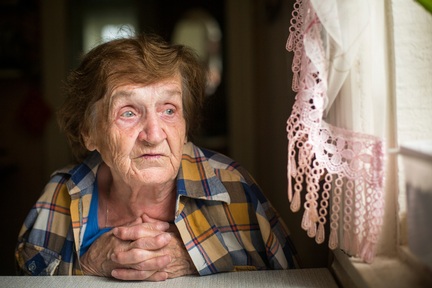Guide launched to help older people who may be at risk of depression
It is estimated that 85 per cent of older people living with depression do not receive any help from the NHS. In response to these latest figures, older people’s charity, Independent Age have launched a new free information guide to support older people who may be at risk of depression.

The free guide titled: 'Dealing with Depression', contains practical information on what can affect a person’s mental health, when they should see a doctor and where they can go for help, as well as tips and advice on staying well and how to help someone you’re concerned about.
Chief executive of Independent Age, Janet Morrison, commented: “Depression is not a normal part of ageing, and no-one should have to suffer alone if they have concerns about their mental health. There is help available, no matter how long you or an older friend or relative have felt like this. Our new guide, ‘Dealing with Depression’, will help you know where to turn.”
Figures from the Mental Health Foundation highlight the UK’s ageing population is growing rapidly, resulting in older people becoming more vulnerable to mental health problems.
The guide from Independent Age recognises that many older people are less likely to be diagnosed with depression, often because symptoms can appear differently in older people, resulting in them being less likely to be referred for talking therapies despite these being just as effective for them as they are for younger people.
Depression can affect anyone and can be used to describe a range of different moods, from feeling a bit low - to finding it difficult to cope with everyday life.
There are almost one quarter of men and nearly a third of women aged 65 and over affected by depression, however it is predicted that 85 per cent of those affected receive no help from the NHS.
Since 1974, the number of older people living in the UK aged 65 and over has increased 47 per cent, accounting for almost 18 per cent of the population in 2014. The number of people aged 75 and over increased by almost 90 per cent during this period, and now accounts for eight per cent of the UK's total population.

The growth in population has seen the number of older people affected by depression increase, resulting in more older people being affected than any other age group.
Reasons for this include increased vulnerability in later life, such as: loneliness and isolation, being widowed or divorced, being retired or unemployed and having a physical disability or illness.
Neurobiological changes associated with ageing, prescribed medication for other conditions and genetic susceptibility – which increase with age, are all linked factors associated with an increased risk of depression. While a number of other mental health problems can affect older people including: anxiety, delirium and late-onset schizophrenia.
Statistics from the Royal College of Psychiatrists suggest that depression could affect as many as one-in-five older people living in the community and two-in-five living in care homes. While the Health & Social Care Information Centre (HSCIC) report that the number of people in contact with their local mental health services increases significantly after the age of 70.
The new free guide is suitable for use by older people, their families and those who work with them. Guides can be ordered in bulk by healthcare and social care professionals by calling 0800 319 6789 or you can download the guide from: www.independentage.org/information.
Latest Innovative Care News
 13-May-19
'Pink drink' brain cancer treatment rolled out across NHS in memory of Baroness Jowell
13-May-19
'Pink drink' brain cancer treatment rolled out across NHS in memory of Baroness Jowell
 25-Apr-19
Louis Tomlinson helps 83-year-old who lost wife to dementia complete bucket list
25-Apr-19
Louis Tomlinson helps 83-year-old who lost wife to dementia complete bucket list
 22-Mar-19
UK's top care home handyman takes residents to pub for pie and pint
22-Mar-19
UK's top care home handyman takes residents to pub for pie and pint
 12-Feb-19
Michael McIntyre's jokes tested to see if they stop elderly catching flu
12-Feb-19
Michael McIntyre's jokes tested to see if they stop elderly catching flu
 07-Jan-19
'We were lucky to find it': Family's delight as care home is rated Outstanding
07-Jan-19
'We were lucky to find it': Family's delight as care home is rated Outstanding